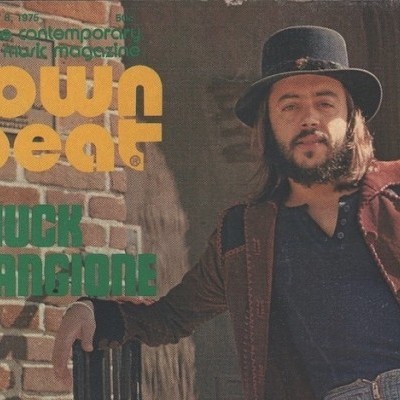Jul 17, 2025 12:44 PM
DownBeat’s 73rd Annual Critics Poll: One for the Record Books
You see before you what we believe is the largest and most comprehensive Critics Poll in the history of jazz. DownBeat…

Walter Becker (1950–2017)
(Photo: Danny Clinch)Guitarist, bassist and songwriter Walter Becker, who co-founded the jazz-rock band Steely Dan with keyboardist and vocalist Donald Fagen, died on Sept. 3. Becker was 67.
Becker, who had been suffering from an undisclosed condition, missed two high-profile stadium concerts this summer. Fagen performed Steely Dan shows without Becker at the Classic West multiband concert at Dodger Stadium in Los Angeles on July 15 and at the similar Classic East event at Citi Field (home of the New York Mets) in Queens on July 29.
Fagen and Becker met in 1967 when both were students at Bard College, where they began collaborating.
In a June 2003 cover story for DownBeat (written by journalist Josef Woodard), Becker reflected on his and Fagen’s jazz roots: “We were both jazz fans coming out of our childhoods. Even before we met, we were listening to jazz radio and buying jazz records.”
In a written statement released Sept. 3, Fagen praised his fallen friend as “an excellent guitarist and a great songwriter,” and he described some of his and Becker’s shared interests: “We liked a lot of the same things: jazz (from the twenties through the mid-sixties), W.C. Fields, the Marx Brothers, science fiction, Nabokov, Kurt Vonnegut, Thomas Berger, and Robert Altman films come to mind. Also soul music and Chicago blues.”
Steely Dan’s debut, Can’t Buy A Thrill, was released in 1972 and contained the hit single “Do It Again,” which reached No. 6 on the Billboard pop chart. Fagen and Becker composed all the songs on the album, and the name Steely Dan eventually came to indicate just those two musicians, who composed together and hired top-shelf studio players to help them record albums.
Thanks to pop hits, Steely Dan appealed to mainstream music fans. Thanks to its high level of musicianship and eagerness to collaborate with players like saxophonist Wayne Shorter and guitarist Larry Carlton, Steely Dan also had a huge following among jazz fans.
Steely Dan scored numerous Top 40 hits that eventually became staples in the classic rock radio format, including “Reeling In The Years,” “Rikki Don’t Lose That Number,” “Black Friday” “Peg,” “Deacon Blues,” “FM (No Static At All),” “Josie,” “Hey Nineteen” and “Time Out Of Mind.”
The band was prolific in the recording studio in the 1970s. Following its debut, Steely Dan released Countdown To Ecstasy (1973), Pretzel Logic (1974), Katy Lied (1975), The Royal Scam (1976), Aja (1977) and Gaucho (1980).
Steely Dan broke up in 1981. Becker went on to work with the British band China Crisis, and he also performed on and produced Fagen’s second solo album, Kamakiriad (1993). In turn, Fagen played on and produced Becker’s solo debut, 11 Tracks Of Whack (1994).
Steely Dan reformed in 1993 and embarked on its first tour in 19 years. Steely Dan would release two more studio albums, Two Against Nature (2000) and Everything Must Go (2003) as well as two concert albums, Alive In America (1995) and Plush TV Jazz-Rock Party (2000).
Two Against Nature won Grammys in the categories Album of the Year and Best Pop Vocal Album. A track from the album, “Cousin Dupree,” won the Grammy for Best Pop Performance by a Duo or Group with Vocal. By this point in the band’s career, it had established a reputation for being meticulous in the studio, not only with instrumentation and arrangements, but also with audio technology. Two Against Nature won the Grammy for Best Engineered Album, Non-Classical, an honor that went to recording engineers Dave Russell, Elliot Scheiner, Phil Burnett and Roger Nichols.
Steely Dan was inducted into the Rock & Roll Hall of Fame in 2001. In the 2001 DownBeat Readers Poll, Steely Dan topped the category Beyond Group, and Two Against Nature won the Beyond Album category.
In 2008, Becker released a second solo album, Circus Money, on which he collaborated with about two dozen artists, including Chris Potter (tenor saxophone), Keith Carlock (drums, percussion), Larry Klein (bass), Luciana Souza (pandeiro and vocals) and Larry Goldings (organ). Other keyboardists on the album were Ted Baker, Jim Beard and Henry Hey.
In the 2003 DownBeat cover story, Becker talked about the fact that Steely Dan had achieved commercial success and longevity while also remaining idiosyncratic. “That is an admirable thing,” Becker said. “ We’ve been lucky to have both of those things. We were naive enough to think that what we wanted to do was some sort of shoe-in. Luckily, things worked out as well as they have. [In] the context of the music business as it exists now, think of how impossible it would be for us to slip through the cracks the way we did back then. Nobody was paying much attention.”
That would certainly change, as Steely Dan would draw an enormous amount of attention, becoming the rare band to release platinum-selling albums while maintaining a devoted following among both jazz and rock fans.
Neil Portnow, president and CEO of The Recording Academy, released the following statement: “With Steely Dan partner Donald Fagen, Walter Becker created some of the smartest, most artful rock to ever hit the charts. Brimming with irony and filled in with brush strokes of jazz and r&b, three of the group’s albums—1977’s Aja, 1980’s Gaucho and 2000’s Two Against Nature—were nominated for the Album of the Year Grammy, with the latter winning the award. Walter and Steely Dan set the standard for sophisticated progressive pop, and he will be greatly missed. Our condolences go out to his family, friends and colleagues.” DB

James Brandon Lewis earned honors for Artist of the Year and Tenor Saxophonist of the Year. Three of his recordings placed in the Albums of the Year category.
Jul 17, 2025 12:44 PM
You see before you what we believe is the largest and most comprehensive Critics Poll in the history of jazz. DownBeat…

Galper was often regarded as an underrated master of his craft.
Jul 22, 2025 10:58 AM
Hal Galper, a pianist, composer and arranger who enjoyed a substantial performing career but made perhaps a deeper…

Chuck Mangione on the cover of the May 8, 1975, edition of DownBeat.
Jul 29, 2025 1:00 PM
Chuck Mangione, one of the most popular trumpeters in jazz history, passed away on July 24 at home in Rochester, New…

“Hamiet was one of the most underrated musicians ever,” says Whitaker of baritone saxophonist Hamiet Bluiett.
Jul 8, 2025 7:30 AM
At 56, Rodney Whitaker, professor of jazz bass and director of jazz studies at Michigan State University, is equally…
Jul 17, 2025 11:35 AM
The DownBeat Critics Poll provides a wonderful snapshot of the jazz scene today, with much to explore and many great…